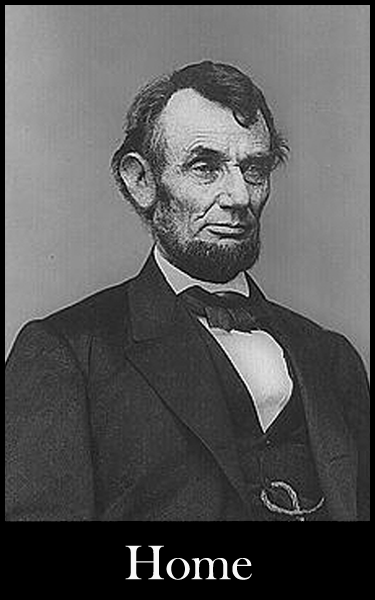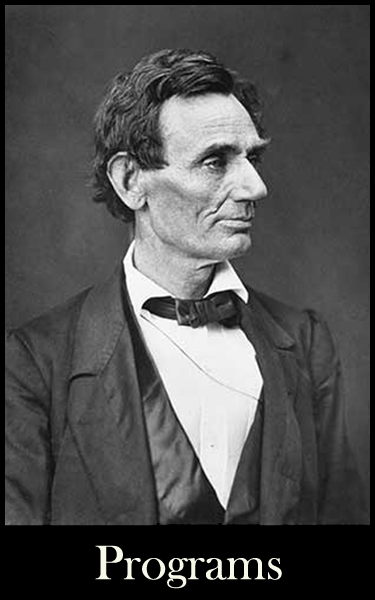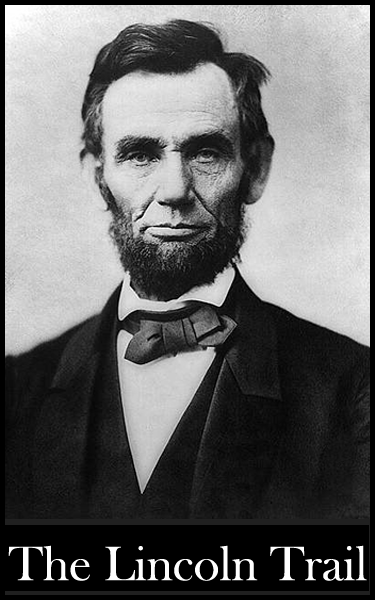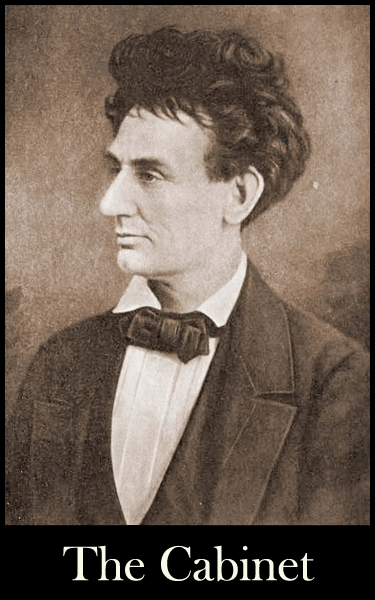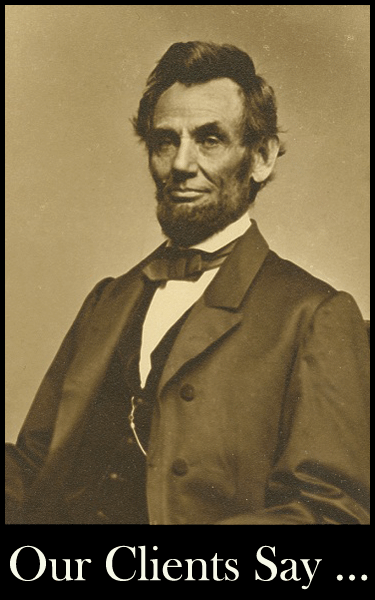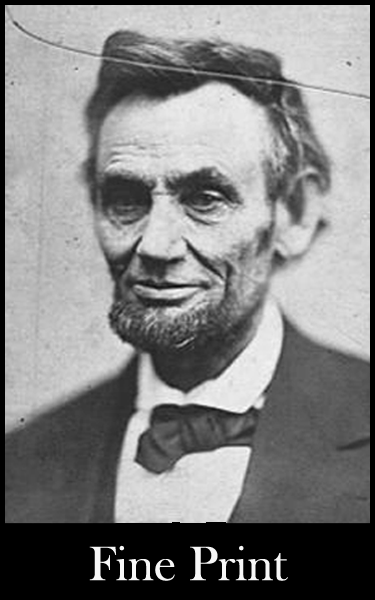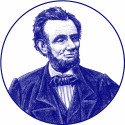

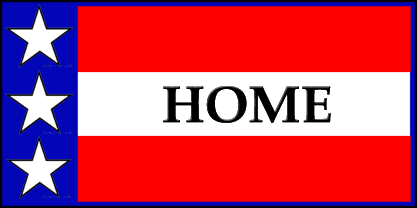
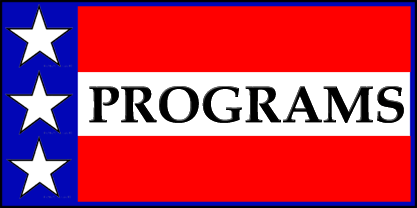
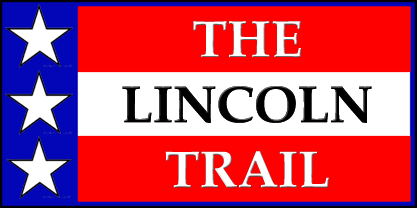

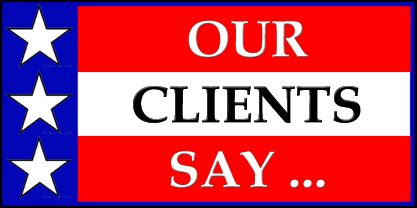
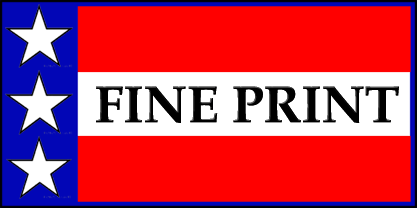

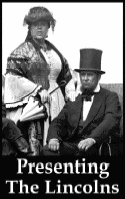

The Newsletter of Lincoln For The Ages
FEBRUARY
2010
![]()
![]()
![]()
![]()
![]()
![]()
![]()
![]()
![]()
![]()
![]()
![]()
![]()
![]()
![]()
![]()
UPCOMING PERFORMANCES
Sat., Feb. 13
MAY
Sat., May 15
Sun., May 30
JUNE
Thu, June 3
Fri, June 4

Presidents Day, St. Paul's Church National Historic Site, Mount Vernon, NY - talks and re-enactments commemorating President’s Day and February as African American History Month, including appearances by Presidents Washington, Lincoln and Franklin D. Roosevelt, as well as talks about Frederick Douglass and Abraham Lincoln
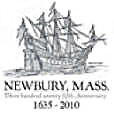 Forever Free: Lincoln's Journey to Emancipation (Exhibit), Pollard
Memorial Library, Lowell, MA
Forever Free: Lincoln's Journey to Emancipation (Exhibit), Pollard
Memorial Library, Lowell, MA375th Anniversary Celebration, Town of Newbury, MA
Civil War Day, Brownstone Intermediate School, Portland, CT
Civil War Day, Peck Place School, Orange, CT
2009
APPEARANCES

LINCOLN DAY, Captain Forbes House Museum, Milton, MA
Under the auspices of Presenting The Lincolns, Mary Todd Lincoln joined President Lincoln for this annual event. Besides each of them giving a speech, the President and First Lady engaged in a gentle banter, to the delight of the museum guests who were given the opportunity to eavesdrop on the domestic side of life in the White House. The Captain Forbes House Museum specializes in items of the China Trade and in Lincolniana.
SCHOOL PROGRAMS
The Year 2009 found us in schools all over, about half of them with the First Lady, in Connecticut, Rhode Island, and New Hampshire. Birthday parties and cakes abounded at these schools!
COMMUNITY DAY at the University of Hartford, West Hartford, CT
We joined the festivities at the annual Community Day on the campus of the University of Hartford. This day opens the campus grounds to the public, and a broad variety of attractions provides entertainment for adults and children alike. Many local and regional agencies and groups displayed and demonstrated their wares and services, adding to the fair-like atmosphere. The President gave several speeches, in between which he toured the grounds, speaking with visitors and posing for photographs. He even participated in the reading marathon in which all of the poems of Edgar Allan Poe (also born in 1809) were read out loud.
LINCOLN-DOUGLAS DEBATE, Concord, MA
Lincoln For The Ages provided the Lincoln part for a modified Lincoln-Douglas debate as part of a broader Lincoln Bicentennial program, organized by the Steinberg-Lalli Charitable Foundation of Acton, MA, and the Concord Historical Commission of Concord, MA. Besides the debate, several guest lecturers spoke about unique aspects of Lincoln, with musical interludes between speakers. All in all, a fine evening by which to honor the memory of Lincoln.
 OLD-FASHIONED
FOURTH OF JULY, Lawrence, MA
OLD-FASHIONED
FOURTH OF JULY, Lawrence, MA
Promoting local community involvement, the Lawrence Heritage State Park
asked Lincoln For
The Ages to
participate in its Fourth of July observances.
Besides family games and a luncheon
 provided
by local businesses,
volunteers from the audience read sections of the Declaration of
Independence.
Lincoln led a small parade
in the locale of the park, and the celebration closed
with a sing-along.
Coordinated with the local Sail-to-Trail
program, the event was
partially funded by a grant from the
Lawrence Cultural Council, supported by the Massachusetts Cultural
Council.
provided
by local businesses,
volunteers from the audience read sections of the Declaration of
Independence.
Lincoln led a small parade
in the locale of the park, and the celebration closed
with a sing-along.
Coordinated with the local Sail-to-Trail
program, the event was
partially funded by a grant from the
Lawrence Cultural Council, supported by the Massachusetts Cultural
Council.
GETTYSBURG ADDRESSED, Longfellow National Historic Site, Cambridge,
MA
On a fine July day on the lawn of the Longfellow House (which also
served as headquarters to George Washington in the early days of the
American Revolution), President Lincoln had the opportunity to meet with
Edward Everett, the main speaker at Gettysburg to discuss the finer
points of that memorable day in November 1863 for which Lincoln is far
better known, although his speech was far shorter than Everett's.
Everett told Lincoln that Lincoln had come closer to the meaning of the
day in three minutes than he [Everett] had come in two hours, which
Lincoln took as a high compliment, coming from this
internationally renown American
statesman.
VICTORIAN TEA, Parsonsfield
Seminary, Parsonsfield, ME
![]() First
Lady Mary Todd Lincoln joined President Lincoln for a most bucolic
engagement at the historic
Parsonsfield Seminary,
which hosts an annual Victorian
Tea. The Friends of ParSem
so enjoyed Mrs.
Lincoln
a few years ago
that they
wanted
to have the First Couple on
hand to celebrate the
First
Lady Mary Todd Lincoln joined President Lincoln for a most bucolic
engagement at the historic
Parsonsfield Seminary,
which hosts an annual Victorian
Tea. The Friends of ParSem
so enjoyed Mrs.
Lincoln
a few years ago
that they
wanted
to have the First Couple on
hand to celebrate the
 President's
birthday. A fine
afternoon for domestic banter
between Abraham and Mary, followed by a lovely, light repast.
This event was funded in part
by
the Maine Arts Commission and
the Maine Humanities Council.
President's
birthday. A fine
afternoon for domestic banter
between Abraham and Mary, followed by a lovely, light repast.
This event was funded in part
by
the Maine Arts Commission and
the Maine Humanities Council.
CIVIL WAR WEEKEND, Hearthside
Homestead and Chase Farm, Lincoln, RI
Co-hosted by The Friends of Hearthside, this event featured battle
reenactments, a Civil War civilian encampment and activities, and a
raffle for dinner with General Grant and President Lincoln in Grant's
headquarters camp. The dinner had its own magic, as first-person,
living history conversation on 19th Century topics of national and
international import rolled effortlessly around the table, while
white-gloved soldiers waited the tables and drained the
fast-accumulating rain from the tent-fly overhead. A highlight of
the weekend was a press conference and interview with Judge Frank
Williams,
Chief Justice (Ret.) of the
Rhode Island Supreme Court and
a devoted Lincoln scholar.
CIVIL
WAR WEEKEND, Campagnone Common, Lawrence, MA
 Mrs. Lincoln joined the President again for a pleasant afternoon on the
common. General and Mrs. Grant hosted a quiet Victorian tea at
their headquarters tent, and Union soldiers of all branches of the army
- infantry, cavalry, and artillery - drilled and exercised to the
delight of visitors. Organized and hosted by the Lawrence Civil
War Memorial Guard, which
includes the 6th Massachusetts
Volunteers, who, in responding to Lincoln's call for troops, were
attacked by Baltimore rioters as they marched between railroad stations.
Mrs. Lincoln joined the President again for a pleasant afternoon on the
common. General and Mrs. Grant hosted a quiet Victorian tea at
their headquarters tent, and Union soldiers of all branches of the army
- infantry, cavalry, and artillery - drilled and exercised to the
delight of visitors. Organized and hosted by the Lawrence Civil
War Memorial Guard, which
includes the 6th Massachusetts
Volunteers, who, in responding to Lincoln's call for troops, were
attacked by Baltimore rioters as they marched between railroad stations.
HERITAGE WEEKEND, Smith-Harris House, East Lyme, CT
President and Mrs. Lincoln made a return visit to this fine event.
Rain on Saturday dampened the spirits of those less intrepid souls, but
Sunday came off warm and dry, ideal for the Victorian Tea held outside
under the dining fly. This timeline event features historical
periods from American history. First-person presentations go on
all day, making this event particularly notable. Where else are
you going to hear an antebellum Southern planter tell you about why
slavery is important to his business? Or see a Punch and Judy
puppet show? Saturday evening always finds the house host to a
candlelight tour, each year an original theatrical production.
![]()
![]()
REAL HISTORY
LINCOLN’S SHARED PLACE IN HISTORY
Even as notable as Lincoln became in his lifetime, and after, he shared
his birth year and his birth day with other notable historical
individuals. The list below is only a few of them.
Jan 4 Louis Braille - developed Braille reading system for the
blind
Jan 19 Edgar Allan Poe - American author and poet
Feb 3 Felix Mendelssohn - German music composer
Feb 12 Charles Darwin - scientist, theory of evolution, The Origin of Species
Feb 15 Cyrus Hall McCormick, Sr. - inventor of the mechanical harvesting reaper
Mar 31 Edward Fitzgerald - English scholar and poet (The Rubaiyat of Oman Khayyam)
Apr 1 Nikolai Gogol - Russian novelist, humorist, dramatist (“The Inspector General")
Aug 6 Alfred Lord Tennyson - English poet (“The Charge of the Light Brigade”)
Aug 27 Hannibal Hamlin - Lincoln’s Vice President in his first term
Aug 29 Oliver Wendell Holmes, Sr. - American author and poet, father of famous Supreme Court Justice
Nov. 27 Frances Anne “Fanny” Kemble - internationally renown Shakespearian actress
Dec 24 Christopher “Kit” Carson - Union Brig. General, Indian fighter
Dec 29 Albert Pike - Lawyer, Brig. General who raised and led Confederate regiments of Native Americans
Dec 29 William
Ewart Gladstone - Prime Minister of Great Britain
LINCOLN'S COUSINS AND SLAVERY
 Lincoln knew very little about his ancestry. As an adult, he did
correspond occasionally with cousins in Virginia, from whence his
grandfather Abraham had emigrated to Kentucky at the end of the 18th
Century. The descendants of “Virginia John” Lincoln who remained at the
Linville Creek homestead near Harrisonburg in the Shenandoah Valley
established a family cemetery which exists today.
Lincoln knew very little about his ancestry. As an adult, he did
correspond occasionally with cousins in Virginia, from whence his
grandfather Abraham had emigrated to Kentucky at the end of the 18th
Century. The descendants of “Virginia John” Lincoln who remained at the
Linville Creek homestead near Harrisonburg in the Shenandoah Valley
established a family cemetery which exists today.
After the Civil War, former slaves were free to leave the plantations and go make new lives for themselves. Some did move around, looking to settle new homes and communities for themselves. Some went to the western frontier. Some migrated north to industrial centers. Others stayed on the plantations, the only home they had ever known, with former masters who had treated them well.
The Virginia Lincolns were a slave-holding family. At the end of the war, some of their former slaves stayed on, among them Uncle Ned and his wife Queen. The Lincoln family regarded these African Americans so much as family members that when they died, the Lincolns buried them in the family plot along with the rest of the Lincolns, without separation or distinction.
LINCOLN BIRTHDAY FACTS
Lincoln’s birthday was a separate holiday from Washington’s birthday
until 1971. It never was a federally recognized holiday (a day off from
work), as Washington’s is. It is still a separate legal holiday in
several states.
People began celebrating Washington’s birthday (February 22) beginning in 1796, almost four years before his death (December 14, 1799). The observance of Washington’s birthday as a federal holiday was signed into law by President Chester Arthur in 1885.
Observance of Lincoln’s birthday (February 12) began in Congress in 1866.
In 1892, the State of Illinois was the first state to make Lincoln’s birthday a state holiday; other states followed suit.
In 1909, Congress officially sanctioned Lincoln’s birthday as a holiday.
In 1971, the observances of Lincoln’s and Washington’s birthdays were
combined, to be held on the Monday closest to Washington’s birthday, and
named Presidents’ Day by President Richard M. Nixon.
WHAT LINCOLN WAS DOING IN FEBRUARY
February 1817: Perry County, Indiana. "At this place,
A[braham] took an early start as a hunter, which was never much improved
afterwards. (A few days before the completion of his eighth year,
in the absence of his father, a flock of wild turkeys approached the new
log-cabin, and A. with a rifle gun, standing inside, shot through a
crack, and killed one of them. He has never since pulled a trigger
on any larger game.)"
Lincoln's own words, from an autobiography written for John L. Scripps,
June 1860, as campaign material for the presidential race, from The
Collected Works of Abraham Lincoln, Vol. IV, edited by Roy P. Basler,
1953.
![]()
![]()
HOW OTHERS SAW LINCOLN
"I
have only recently come to know the President, except from a passing
introduction," Joseph Henry, Secretary of the Smithsonian Institution,
told L. E. Chittenden in the spring of 1862. "I have lately met
him five or six times. He is producing a powerful impression upon
me, more powerful than any one I can now recall. It increases with
every interview. I think it my duty to take philosophic views of
men and things, but the President upsets me. If I did not resist
the inclination, I might even fall in love with him."
Chittenden, a Register of the Treasury, pressed Henry for more details
about his impressions of Lincoln, perhaps aware even at that early date
that he would ultimately collect and prepare observations of this kind
about Lincoln for future publication.
Henry went on: "I have not yet arranged my thoughts about him in a form
to warrant their expression, but I can say so much as this: President
Lincoln impresses me as a man whose honesty of purpose is transparent,
who has no mental reservations, who may be said to wear his heart upon
his sleeve. He has been called coarse. In my interviews with
him he converses with
apparent freedom, and
without a trace of coarseness. He has been called ignorant.
He has shown a comprehensive grasp of every subject on which he has
conversed with me. His views of the present situation are somewhat
novel, but seem to me unanswerable. He has read many books and
remembers their contents better than I do. He is associated with
men who I know
are great. He impresses me as their equal, if not their superior.
I desired to induce him to understand, and look
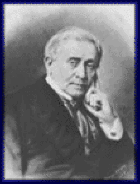 favorably
upon, a change which
I wish to make in the
policy of the Light-House Board in a matter requiring some scientific
knowledge. He professed his ignorance, or, rather, he ridiculed
his knowledge of it, and yet he discussed it intelligently."
favorably
upon, a change which
I wish to make in the
policy of the Light-House Board in a matter requiring some scientific
knowledge. He professed his ignorance, or, rather, he ridiculed
his knowledge of it, and yet he discussed it intelligently."
From
Recollections of President Lincoln and His Administration, by
L. E. Chittenden, His Register of the Treasury, New York: Harper &
Brothers, Franklin Square, 1891.
Joseph Henry (photo at left) (1797-1878), a physicist who pioneered in electricity and
magnetism, was the first Secretary (or director) of the Smithsonian
Institution from 1846 to 1878. His vision formed the scope and
mission of the Smithsonian as the unique research and cultural
institution that we know today.
Lucius E. Chittenden (no photo available) (1824-1900), a native of
Vermont, was an author of several books on topics of American history, a
lawyer, and a politician, as well as a banker, which experience gave him
credibility for his position as Register of the Treasury in Lincoln's
administration. He was prominent in the anti-slavery movement, was
appointed as the Vermont delegate to the Washington Peace Conference
which tried to avert the coming Civil War.
DOLT QUOTE:
"I am tired of all this sort of thing called science here. ...
We have spent millions in that sort of thing for the last few years, and
it is time it should be stopped." Simon Cameron, speaking about
the Smithsonian Institution, 1861.
Cameron was
Lincoln's first Secretary of War, whose Cabinet appointment proved
short-lived when Cameron was found to be corrupt. Lincoln
ultimately made him an ambassador to Russia and sent him to St.
Petersburg to cool his ambition for personal gain.
![]()
![]()
LINCOLN WIT AND WISDOM
"LET THEM ALL OUT
AT ONCE"
General John A. J. Creswell called at the White House to see the President
the day of the latter's assassination. An old friend, serving in
the Confederate ranks, had been captured by the Union troops and sent to
prison, He had drawn an affidavit setting forth what he know about
the man, particularly mentioning extenuating circumstances.
Creswell found the President very happy. He was greeted with: "Creswell, old fellow, everything is bright this morning. The War is over. It has been a tough time, but we have lived it out, - or some of us have," and he dropped his voice a little on the last clause of the sentence. "But it is over; we are going to have good times now, and a united country."
General Creswell told his story, read his affidavit, and said, "I know the man has acted like a fool, but he is my friend, and a good fellow; let him out; give him to me, and I will be responsible that he won't have anything more to do with the rebs."
"Creswell," replied Mr. Lincoln, "you make me think of a lot of young folks who once started out Maying. To reach their destination, they had to cross a shallow stream, and did so by means of an old flatboat. When the time came to return, they found to their dismay that the old scow had disappeared. They were in sore trouble, and thought over all manner of devices for getting over the water, but without avail.
"After a time, one of the boys proposed that each fellow should pick up the girl he liked best and wade over with her. The masterly proposition was carried out, until all that were left upon the island was a little short chap and a great, long, gothic-built, elderly lady.
"Now, Creswell, you are trying to leave me in the same predicament. You fellows are all getting your own friends out of this scrape; and you will succeed in carrying off one after another, until nobody but Jeff Davis and myself will be left on the island, and then I won't know what to do. How should I feel? How should I look, lugging him over?
"I guess the way to
avoid such an embarrassing situation is to let them all out at once."
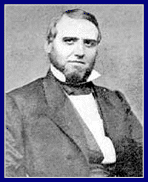 From
"Abe" Lincoln's Yarns and Stories, A Complete Collection of the Funny
and Witty Anecdotes that made Lincoln Famous as America's Greatest Story
Teller, by Colonel Alexander K. McClure, copyright by Henry Neil, 1901.
From
"Abe" Lincoln's Yarns and Stories, A Complete Collection of the Funny
and Witty Anecdotes that made Lincoln Famous as America's Greatest Story
Teller, by Colonel Alexander K. McClure, copyright by Henry Neil, 1901.
Alexander K. McClure
(1828-1909) was a close personal friend of Lincoln. An eminent
journalist, he founded in 1869 and was editor of the Philadelphia
"Times." He started out as a tanner's apprentice, spending his
free time reading voraciously. He was successful in the newspaper
world, in politics, in law, and in the army during the Civil War.
In his capacity as chairman of the Republican State Committee of
Pennsylvania, he was instrumental in Lincoln's presidential nomination.
![]()
![]()
LINCOLN QUOTE
Lincoln was known for telling stories, but few of them were his own
invention.
He just recognized a good story when he heard it, and knew when to apply
it.
"You speak
of Lincoln stories. I don't think that is a correct phrase.
I don't make the stories mine by telling them. I'm only a retail
dealer."
.
![]()
![]()
![]()
![]()
![]()
![]()
![]()
![]()
![]()
![]()
![]()
![]()
![]()
![]()
![]()
![]()
LINCOLN
FOR
THE
AGES
P.O. Box 2057,
Danvers, MA 01923
781-224-0530


